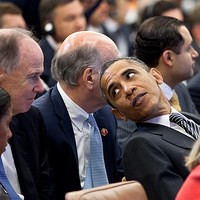![]()
Tue, May 25, 2010 | Edited by Crethi Plethi
The Alexandria Protocol
In 1942, the British War Cabinet needed the support of the colonies to survive against Nazi Germany, especially in the phase when Nazi General Rommel was advancing towards Egypt (November 1942) in North Africa. The British organized a dialogue with representatives of Arab countries whose outcome was the Alexandria Protocol.
Toward the end of World war II, on October 07, 1944, in Alexandria, heads of five Arab countries agreed on the foundation of a joint Arab Organization, which led to the formation of the League of Arab States in the following year (march 22, 1945). They all consented on what became known as the Alexandria Protocol and formed an unified stance regarding the future of the Middle East and non-intervention of foreign powers.
The agreement stated that all participating countries will be represented on an equal footing. The main aim of this organization will be to strengthen the relations between Arab states and to participate actively in the coordination of their political plans and foreign policy without interference with their independence but promising protection by suitable means in case of aggression against a member state and its sovereignty.
The protocol also outlined the Arab concern regarding the further development of Palestine as a homeland for the Jews under the British Mandate. A special resolution on Palestine called for the cessation of Jewish immigration.
The Alexandria Protocol
October 07, 1944
The undersigned, chiefs and members of Arab delegations at the Preliminary Committee of the General Arab Conference, viz:
The President of the Preliminary Committee
H.E. Mustafa al-Nahhas Pasha, Egyptian Prime Minister and Minister of Foreign Affairs; head of the Egyptian delegation;
Syrian Delegation
H.E. Sa’dallah al-Jabiri, Syrian Prime Minister and head of the Syrian delegation;
H.E. Jamil Mardam Bey, Minister of Foreign Affairs;
H E. Dr. Nagib al-Armanazi, Secretary General of the Presidency of the Syrian Republic;
H.E. M. Sabri al-‘Asali, deputy of Damascus;
Trans-Jordanian Delegation
H.E. Tawfiq Abu al-Huda (also known as Tawfik Pasha Abul-Huda), Trans-Jordanian Prime Minister and Minister Of Foreign Affairs, head of the Trans-Jordanian delegation;
H.E Sulayman al-Sukkar Bey, Financial Secretary of the Ministry of Foreign Affairs;
Iraqi Delegation
H.E. Hamdi al-Bahjaji, Iraqi Prime Minister and head of the Iraqi delegation;
H.E. Arshad al-‘Umari, Minister of Foreign Affairs;
H.E. Nuri al-Sa’id, former Iraqi Prime Minister;
H. E. Tahsin al-‘Askari, Iraqi Minister Plenipotentiary in Egypt;
Lebanese Delegation
H.E. Riyad al-Sulh Bey, Lebanese Prime Minister and head of the Lebanese delegation;
H.E. Salim Taqla Bey, Minister of Foreign Affairs;
H.E. Musa Mubarak, Chief of the Presidential Cabinet;
Egyptian Delegation
H.E. Nagib al-Hilali Pasha, Minister of Education;
H.E. Muhammad Sabri Aub-‘Alam Pasha, Minister of Justice;
H.E. Muhammad Salah-al-din Bey, Under Secretary of State of the Ministry of Foreign Affairs,
Anxious to strengthen and consolidate the ties which bind all Arab countries and to direct them toward the welfare of the Arab world, to improve its conditions, insure its future, and realize its hopes and aspirations.
And in response to Arab public opinion in all Arab countries,
Have met at Alexandria from Shawwal 8, 1363 (September 25, 1944) to Shawwal 20, 1363 (October 7, 1944) in the form of a Preliminary Committee of the General Arab Conference, and have agreed as follows:
1. League of Arab States
A League will be formed of the independent Arab States which consent to join the League. It will have a council which will be known as the “Council of the League of Arab States” in which all participating states will be represented on an equal footing.
The object of the League will be to control the execution of the agreements which the above states will conclude; to hold periodic meetings which will strengthen the relations between those states; to coordinate their political plans so as to insure their cooperation, and protect their independence and sovereignty against every aggression by suitable means; and to supervise in a general way the affairs and interests of the Arab countries.
The decisions of the Council will be binding on those who have accepted them except in cases where a disagreement arises between two member states of the League in which the two parties shall refer their dispute to the Council for solution. In this case the decision of the Council of the League will be binding.
In no case will resort to force to settle a dispute between any two member states of the League be allowed. But every state shall be free to conclude with any other member state of the League, or other powers, special agreements which do not contradict the text or spirit of he present dispositions.
In no case will the adoption of a foreign policy which may be prejudicial to the policy of the League or an individual member state be allowed.
The Council will intervene in every dispute which may lead to war between a member state of the League and any other member state or power, so as to reconcile them.
A subcommittee will be formed of the members of the Preliminary Committee to prepare a draft of the statutes of the Council of the League and to examine the political questions which may be the object of agreement among Arab States.
2. Cooperation in Economic, Cultural, Social, and Other Matters
A. The Arab States represented on the Preliminary Committee shall closely cooperate in the following matters:
(1) Economic and financial matters, i.e., commercial exchange, customs, currency, agriculture, and industry.
(2) Communications, i.e., railways, roads, aviation, navigation, posts and telegraphs.
(3) Cultural matters.
(4) Questions of nationality, passports, visas, execution of Judgments, extradition of criminals, etc.
(5) Social questions.
(6) Questions of public health.
B. A subcommittee of experts for each of the above subjects will be formed in which the states which have participated in the Preliminary Committee will be represented. This subcommittee will prepare draft regulations for cooperation in the above matters, describing the extent and means of that collaboration.
C. A committee for coordination and editing will be formed whose object will be to control the work of the other subcommittees, to coordinate that part of the work which is accomplished, and to prepare drafts of agreement which will be submitted to the various governments.
D. When all the subcommittees have accomplished their work, the Preliminary Committee will meet to examine the work of the subcommittees as a preliminary step toward the holding of a General Arab Conference.
3. Consolidation of These Ties In the Future
While expressing its satisfaction at such a happy step, the Committee hopes that Arab States will be able in the future to consolidate that step by other steps, especially if post-war events should result in institutions which bind various Powers more closely together.
4. A Special Resolution Concerning Lebanon
The Arab States represented on the Preliminary Committee emphasize their respect of the independence and sovereignty of Lebanon in its present frontiers, which the governments of the above States have already recognized in consequence of Lebanon’s adoption of an independent policy, which the Government of that country announced in its program of October 7, 1943, unanimously approved by the Lebanese Chamber of Deputies.
5. A Special Resolution Concerning Palestine
A. The Committee is of the opinion that Palestine constitutes an important part of the Arab World and that the rights of the Arabs in Palestine cannot be touched without prejudice to peace and stability in the Arab World.
The Committee also is of the opinion that the pledges binding the British Government and providing for the cessation of Jewish immigration, the preservation of Arab lands, and the achievement of independence for Palestine are permanent Arab rights whose prompt implementation would constitute a step toward the desired goal and toward the stabilization of peace and security.
The Committee declares its support of the cause of the Arabs of Palestine and its willingness to work for the achievement of their legitimate aim and the safeguarding of their just rights.
The Committee also declares that it is second to none in regretting the woes which have been inflicted upon the Jews of Europe by European dictatorial states. But the question of these Jews should not be confused with Zionism, for there can be no greater injustice and aggression than solving the problem of the Jews of Europe by another injustice, i.e., by inflicting injustice on the Arabs of Palestine of various religions and denominations.
B. The special proposal concerning the participation of the Arab Governments and peoples in the “Arab National Fund” to safeguard the lands of the Arabs of Palestine shall be referred to the committee of financial and economic affairs to examine it from all its angles and to submit the result of that examination to the Preliminary Committee in its next meeting.
In faith of which this protocol has been signed at Faruq I University at Alexandria on Saturday, Shawwal 20, 1363 (October 7, 1944).
Translation of the official communique of the Pan-Arab Preliminary Conference made by the American Legation, Cairo; and collated with the Arabic text published in al-Ahram (Cairo), Oct. 8,1944, p. 3.



 RSS
RSS











The Alexandria Protocol http://j.mp/cr0x08
RT @CrethiPlethi: The Alexandria Protocol http://j.mp/cr0x08
[…] This post was mentioned on Twitter by Elisabeth, Crethi Plethi. Crethi Plethi said: The Alexandria Protocol http://j.mp/cr0x08 […]